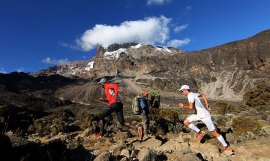关于作者Matt Fitzgerald更多资料见:
Matt Fitzgerald_运动营养学专家_Runner's World书籍作者-跑步作家-人物百科-跑步百科
//www.nduoke.com/renwubaike/matt-fitzgerald
Matt Fitzgerald出版的十多本畅销运动营养、跑步饮食书籍合集见:
Matt Fitzgerald(Runner's World运动营养学专家)书籍合集(附PDF电子书网盘下载地址)
//www.nduoke.com/running-books/matt-fitzgerald-books
《Brain Training for Runners》简介:
Based on new research in exercise physiology, author and running expert Matt Fitzgerald introduces a first-of-its-kind training strategy that he's named "Brain Training." Runners of all ages, backgrounds, and skill levels can learn to maximize their performance by supplying the brain with the right feedback. Based on Fitzgerald's eight-point brain training system, this book will help runners:
- Resist running fatigue
- Use cross-training as brain training
- Master the art of pacing
- Learn to run "in the zone"
- Outsmart injuries
- Fuel the brain for maximum performance
- And more
Packed with cutting-edge research, real-world examples, and the wisdom of the world's top distance runners, Brain Training for Runners offers easily applied advice and delivers practical results for a better overall running experience.
About the Author
Matt Fitzgerald coaches online through TrainingPeaks.com and serves as a communications consultant to sports nutrition companies. A former editor at several top fitness magazines, he is the author of numerous articles and books. He lives in Northern California.
《Brain Training for Runners》读者评价:
Let me start by saying that I'm a 42 year old runner who got back into running about a year ago. Was way out of shape and knew I needed a big goal in order to get my brain to take things seriously. Chose to run the San Diego Rock N Roll marathon and got started with 20 week training program. I managed to finish, but made many rookie errors along the way. However, I was hooked so I started reading every book I could get my hands on in an effort to run faster, more efficiently, and pain free.
Of all the books, I had narrowed my "favorites" down to three = Lore of Running by Timothy Noakes, ChiRunning by Danny Dryer, and Run Less Run Faster by the Runners World and the Furman Institute. I found these books contained the science, running form, and training plan I needed that made the most sense and seemed to be the most current, effective information available.
When I received Brain Training for Runners, I was immediately impressed and I'm happy to report that it does an excellent job of summarizing the key points in my three favorites noted above and is now my new favorite.
If you are ready to take your running to a new level, I strongly recommend you read this book. The author does a good job of explaining the role our brains play so you can understand what's going on behind the scenes...and train smarter to push through mental barriers that may be holding you back from your true potential. He is a believer in the "central governor model" proposed by Timothy Noakes and I think he does a great job explaining how it all works in layman's terms us runners can comprehend.
In my opinion, the author also does a great job of explaining stride mechanics and providing some excellent cues for you to focus on while running to improve your stride. I found ChiRunning to be an excellent book regarding how to use gravity to run more efficiently and reduce injuries. However, it wasn't until I read Brain Training that I put it all together and now I'm just amazed at the difference it has made in my running.
In Brain Training, the author talks about the ballistic style of running that elite runners use and how they are actually floating in the air the majority of the time. Practicing his cues helped me evolve my stride to emulate the elite runner form and all I can say is wow. The real world changes for me, based on actions I took after reading Brain Training, are nothing short of amazing. Over a period of 3 weeks, I have seen my target marathon pace drop by a full 30 seconds per mile. I now run much faster when doing track intervals and the speed of tempo runs is mind boggling. I continually focus on the authors cues and somehow I am now running my long runs considerably faster with a lower average heart rate!
Should also point out that the training plans the author suggests are very similar to the Run Less Run Faster plans where focus is on 3 quality key runs per week. Difference being that the author is more flexible in his approach whereby he advises you to alter your plan last minute based on how you feel during your workout. He's all about adaptability and also provides an excellent table you can reference to pick target training speeds based on your current perceived fitness level. Something he says you will increase 4 to 6 times over the course of an 18 to 24 month training program. The author also includes a lot on stretching, strength exercise, and nutrition that I found helpful.
In summary, The author really does a great job of covering the full spectrum and putting it all into an easy to follow plan you can customize to your own unique fitness level and self-coach yourself to be a faster runner. I truly believe this is a must read for all runners who are looking to run faster and hit new PR's.
Author, coach, triathlete and Active Expert Matt Fitzgerald presents a revolutionary approach to running in his latest book, Brain Training for Runners. Fitzgerald compiled evidence from the latest research in exercise physiology that challenges conventional runner's wisdom by shifting focus to a "brain-centered" model.
The two-part book begins with a well thought out presentation of the brain-training system applicable to runners of all experience levels. Fitzgerald's motto, "train the brain and the rest will follow," explains how the main goal of brain-training is to develop a heightened awareness for feedback from the running experience to increase maximal capacity, efficiency of stride and injury-prevention.
The Brain Training System
The three feedback loops--collective, objective and subjective--compose the awareness center of the brain-training system. The first step in transitioning to a brain-centered training model is with a thorough understanding of the feedback loops, which Fitzgerald explains extensively in the book. Basically, the collective feedback loop includes classic training strategies; the objective feedback loop records and applies your own performance data such as speed, distance and heart rate to customize the brain-training system; and the subjective feedback loop is information relayed from body to brain through experience. Developing effective communication of this feedback is essential to getting the most from your training.
Fitzgerald's journey through the biology of the brain was a tad overwhelming, but he actually suggests that the reader skip forward to the next section, which illustrates how well he knows his audience.
For example, I can see how the scientific community would benefit from the breakdown of how the "fatty sheath insulates axon-dendrite connections," but it was over my head, so I chose to follow the author's advice and skip ahead to the section on brain-training plans.
Part II of Brain Training for Runners is a selection of plans that are based on the brain-training model from part I. These plans are for the 5K, 10K, half-marathon and marathon distances and, as Fitzgerald explains, they are flexible to promote responsive training and injury-prevention.
Brain Training at Work
Before I encountered Fitzgerald's book, my training was struggling with a lack of direction, and I had two important events approaching: a 5K race and a 50-mile ultra marathon. I applied the brain-centered system to my own training and competition. As my focus shifted from body to brain, a fresh supply of potential was unlocked.
I experienced my first brain-training breakthrough during my 5K race. I had just finished reading a section about the mechanism of "teleoanticipation," which Fitzgerald describes as "knowing intuitively just how much to hold back at the beginning of a maximal running effort to complete the effort without anything left in the tank, yet also without any decline in performance." I was making a conscious evaluation of my abilities as a runner on that given day with what Fitzgerald calls "subconscious brain calculation." Essentially, I was convincing my brain to allow me to sustain my goal pace for the entire duration of the race. Three six-minute-miles later, I had done just that.
During the past month of brain-training, I have not only run the fastest mile split of my athletic career in a 5K race, but I also completed my first 50-mile ultra marathon less than two weeks later. This book provided the mental edge I was looking for and was the catalyst for my recent performance breakthrough.
My favorite advice from Fitzgerald is his incorporation of proprioceptive cues into each of these training plans. Fitzgerald states, "Proprioceptive cues are images and other sensory cues that enable you to modify your stride for the better as you think about them while running." This gives runners a means to monitor and improve their stride during each workout with drills and offers a valuable edge over conventional training systems.
As a multi-sport athlete, I was also happy with Fitzgerald's consistent focus on the customization of training. His assimilation of cross-training and variety into workouts along with the "brain-centered" model made it a no-brainer for me to believe in this system. He even included a section on corrective stretches with pictures and descriptions of each yoga-like movement.
Fitzgerald has taken the science of running to a whole new level with this book. Brain Training for Runners is for any runner searching for a customizable system that supports the continued development of the mind and the body. I am training and competing on a whole new level because of what I discovered while reading this book and have never been more confident in my potential as an athlete because I now have a better understanding of how my brain regulates my body--not the other way around.
Fitzgerald's new book is not as good as the "Cutting Edge Runner." The book looks thick, but there isn't as much substance to it as you would think. This is because half the book consists of training plans. Fitzgerald does back up a lot of what he says with scientific research, but there are still some conclusions he draws that experienced distance runners reading the book will disagree with. This is especially the case with his chapter on hydration. Nevertheless, Fitzgerald does an excellent job of incorporating new ideas on training into his book. There is probably nobody better than him at keeping runners updated on the latest advances in training research and methods. While the book may not be as good as "The Cutting Edge Runner" it is well worth reading for any runner of any level.
This book is thick and looks meaty, but half of it is comprised of stock training programs that may or may not work for a given individual.
The author cites numerous studies but rarely, if ever, tells the reader what the titles of the studies are, where they were conducted, or where the results were originally published. Simply saying "Studies show that..." or "A study done in (insert place name) revealed..." wears thin after a while. As a trained researcher, I was disappointed that these claims weren't backed up very well. The lack of a proper bibliography or list of references definitely caught my attention.
This author clearly has significant experience and enthusiasm. It would appear, however, that most of the evidence cited in this book is based on his personal experience or anecdotes, rather than science.
I found the book easy to read and follow, but I would have liked more evidence to support his claims.
更多runner's world 杂志与书籍见://www.nduoke.com/running-books/runners-world
更多跑步书籍见://www.nduoke.com/running-books
跑步书籍下载见://www.nduoke.com/shujixiazai
跑步书籍百科见://www.nduoke.com/shujibaike




